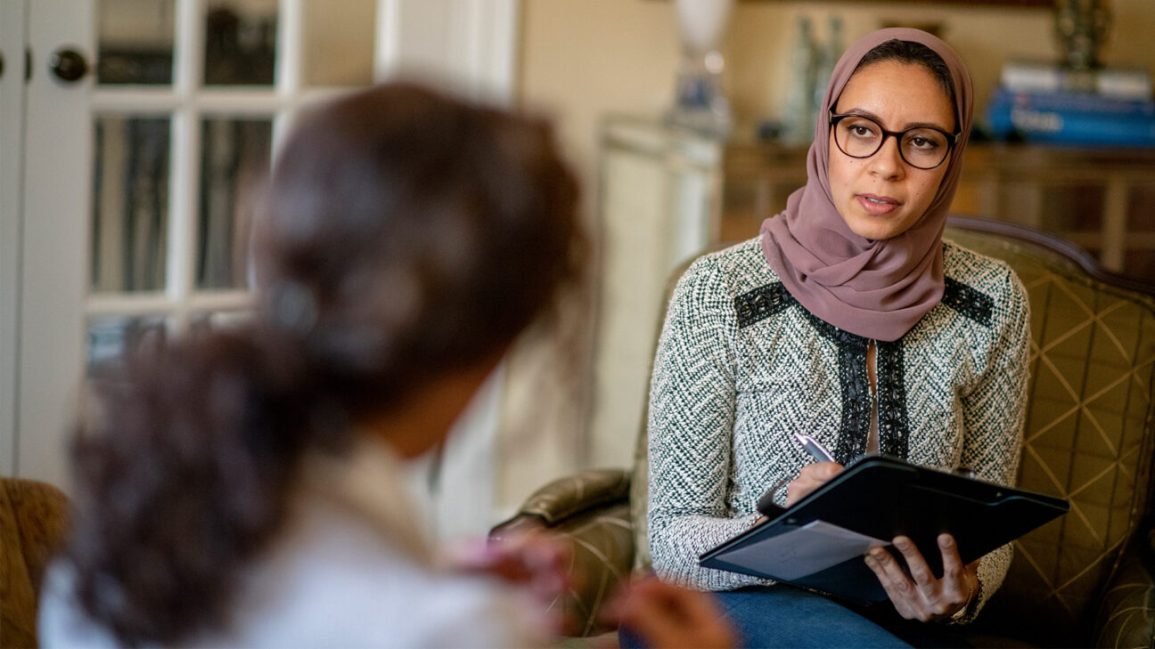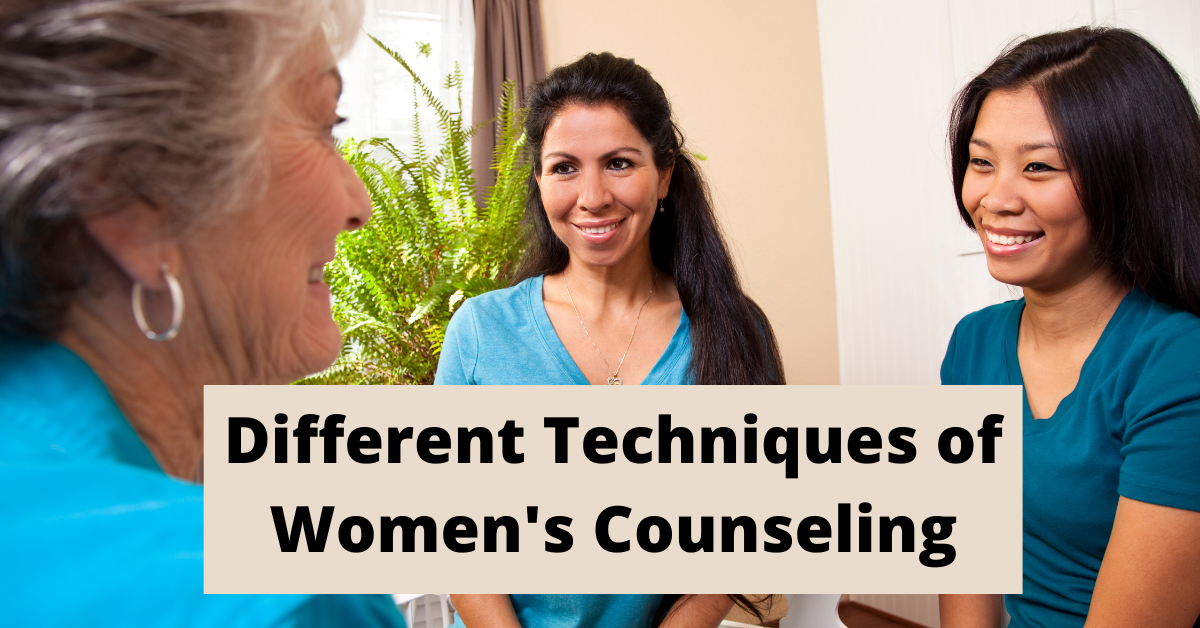Women’s counseling can be an extremely beneficial experience for personal growth. Whether you are struggling with a specific issue or simply want to explore your innermost thoughts and feelings, women’s counseling can help you achieve the insight and understanding you need to move forward in your life. In this comprehensive guide, we will discuss the many benefits of women’s counseling, as well as the different types of therapy that are available to women. We will also provide tips for finding a qualified counselor who can help you achieve your goals.
Contents
- 1 What Is Women’s Counseling?
- 2 Types of Women’s Counseling
- 3 Different Techniques of Women’s Counseling
- 4 What Does Women’s Counseling Help With?
- 5 How Much Does Women’s Counseling Cost?
- 6 What to Expect in a Women’s Counseling?
- 7 Working of Women’s Counseling
- 8 Role of Women’s Counseling In Personal Growth
- 9 Conclusion
- 10 A Word From Therapy Mantra
What Is Women’s Counseling?
 Women’s counseling is a type of counseling that focuses specifically on the needs and issues that affect women. This type of counseling can be extremely beneficial for women who are looking to improve their lives and better understand themselves.
Women’s counseling is a type of counseling that focuses specifically on the needs and issues that affect women. This type of counseling can be extremely beneficial for women who are looking to improve their lives and better understand themselves.
This counseling can cover a wide range of topics. Nowadays this couseling is very popular and it can help with a variety of issues.
One common reason women seek counseling is to deal with the stressors of everyday life. Juggling work, family, and other commitments can be overwhelming, and many women find that talking to a counselor helps them better manage their time and cope with stress.
Counseling can also help women who are struggling with personal issues or relationships. If you’re going through a tough time in your life, or if you’re having trouble communicating with your partner, counseling may be able to help.
Finally, some women turn to counsel in order to explore their sexuality or deal with reproductive health concerns. Whether you’re curious about your own sexuality or have questions about birth control options.
Types of Women’s Counseling

There can be many types of counseling that cater to women. Some of the most common include:
Individual Counseling
Indivisual counseling is one of the best ways to get the most out of women’s counseling. This type of counseling allows you to meet with a counselor one-on-one in order to discuss your issues and concerns.
Group Counseling
 Group counseling is a great option for women who want to get help but don’t feel comfortable meeting with a counselor one-on-one. In group counseling, you’ll meet with other women who are dealing with similar issues and can provide support for one another. In this group counseling, people are able to express their emotions clearly. These women are able to share their issues more effectively.
Group counseling is a great option for women who want to get help but don’t feel comfortable meeting with a counselor one-on-one. In group counseling, you’ll meet with other women who are dealing with similar issues and can provide support for one another. In this group counseling, people are able to express their emotions clearly. These women are able to share their issues more effectively.
Online Counseling
Online counseling is perfect for busy women or those who live far from a therapist’s office. With online counseling, you can communicate with your counselor via email, chat, or video conferencing. This type of counseling is convenient and confidential.
Marriage Counseling
This type of counseling also known as couples counseling is designed to help couples communicate better and resolve conflicts. If you’re having trouble in your relationship, marriage counseling may be the solution.
Family Therapy
Sometimes women’s counseling is offered as part of family therapy. In this type of counseling, you’ll meet with your counselor and your entire family in order to address issues that are affecting the whole family unit.
Different Techniques of Women’s Counseling

There can be many techniques that can be used in women’s counseling. The most common techniques include:
Psychodynamic Therapy
This type of therapy is based on the idea that our past experiences affect our present behavior. During psychodynamic therapy, you’ll discuss your childhood and family history with your counselor in order to better understand why you behave the way you do.
Cognitive Behavioral Therapy
Cognitive-behavioral therapy (CBT) is a practical, goal-oriented form of therapy that can help you change the way you think about things. CBT can be helpful for dealing with stress, anxiety, and other mental health issues.
Solution-Focused Therapy
Solution-focused therapy is a relatively new type of counseling that focuses on solving problems rather than exploring them deeply. This type of therapy can be helpful for finding quick solutions to difficult issues.
Interpersonal Therapy
Interpersonal therapy (IPT) is a type of counseling that focuses on the relationships you have with others. It can be helpful for resolving conflicts and improving communication skills.
What Does Women’s Counseling Help With?

There are many different reasons that women might seek out counseling. Some of the most common issues that women’s counseling can help with include:
Stress Management
Sometimes life can be overwhelming, and it’s helpful to have someone to talk to who understands what you’re going through. Counseling can help women learn how to better manage stress, helping them feel more in control of their lives.
Personal Issues
If you’re struggling with a personal issue such as anxiety or depression, counseling may be able to help. Talking about your problems with a therapist can provide relief and allow you to see things from a new perspective.
Relationship Problems
Coping with relationship issues can be difficult, but counseling can often help couples communicate better and resolve conflicts. If you’re having trouble getting along with your partner or find yourself constantly fighting, counseling may be the solution for you.
Sexual Exploration
Women’s sexuality is often shrouded in secrecy and shame. Counseling can be a safe place for women to explore their sexuality and learn more about themselves. If you’re curious about your own sexuality or want to discuss issues such as masturbation or orgasm, counseling may be right for you.
Reproductive Health
Women’s reproductive health is a topic that is often ignored, but it’s important nonetheless. Counseling can help women understand their bodies better and make informed decisions about birth control and other reproductive health concerns.
How Much Does Women’s Counseling Cost?
The cost of women’s counseling will vary depending on the therapist you see and the type of counseling you receive. However, most counselors charge between $50 and $100 per session.
If you’re considering women’s counseling, it’s important to speak with your insurance company to see if they will cover any of the costs. Many insurers offer partial or full coverage for mental health services.
What to Expect in a Women’s Counseling?

The first thing you should expect when starting women’s counseling is that the therapist will want to get to know you better. They will ask about your background and why you’re seeking counseling.
Then, the therapist will likely discuss the issues you’d like to address during counseling. This can be a time for you to voice your concerns and ask questions about the counseling process.
Finally, the therapist may give you some exercises or tasks to do outside of the session in order to help you address the issues you discussed.
This counseling also helps in building a strong relationship with the therapist and it would be ideal to have weekly sessions for better progress.
Working of Women’s Counseling

The working of women’s counseling is based on the assumption that women are socialized to be relational and expressive. From early childhood, girls are encouraged to share their feelings and connect with others. This tendency carries over into adulthood, where women are more likely than men to seek out counseling when they’re experiencing problems.
The therapist will often use techniques such as questioning, reflective listening, and clarifying statements to help the woman explore her thoughts and feelings. The goal is to help her understand why she’s struggling and find ways to address the issues head-on.
Sometimes these therapies help the women to dig out their suppressed feelings and work through them. This is done with a supportive therapist who will not judge or criticize the woman for her feelings.
The sessions are weekly, so as to build a strong relationship with the therapist and also make progress in resolving the issues. The total number of sessions may vary from person to person depending on the intensity of issues faced by the woman.
The sessions are approximately 50 minutes long and there are about 12-16 sessions in a year.
The therapist should be experienced in working with women and should have a good rapport with the woman. The therapist must also be able to deal with sensitive issues that may arise during counseling.
Role of Women’s Counseling In Personal Growth

While there are many different reasons that women might seek out counseling, all forms of counseling can help women grow as individuals. In particular, women’s counseling can help you:
Understands Yourself Better
One of the main goals of counseling is to allow you to understand yourself better. This includes understanding your thoughts, feelings, and motivations. When you understand yourself better, you’re able to make more informed decisions about your life.
Gains Insight Into Your Relationships
Counseling can also provide insight into your relationships with others. This includes both personal relationships and professional relationships. When you understand how you interact with others, you’re able to build healthier and more satisfying relationships.
Addresses Problems Head-On
Many women avoid counseling because they feel like they need to be “fixed.” However, counseling is not about fixing you. It’s about giving you the tools to address your problems head-on. With counseling, you can learn how to cope with difficult situations and emotions in a healthy way.
Improves Your Overall Well-Being
Counseling can improve your overall well-being. When you’re feeling good mentally and emotionally, it shows in all aspects of your life. You’re able to take on challenges with confidence and handle stress better. Women’s counseling can help get you there.
Makes You Stronger
No one is perfect, and everyone faces challenges in life. However, when you work through these challenges with the help of counseling, you become stronger mentally and emotionally. You learn that you can handle whatever comes your way. This makes you a more resilient person overall.
Helps To Resolve Past Issues
Many women carry around baggage from their past. This can include unresolved issues, traumatic experiences, and dysfunctional relationships. Counseling can help you to resolve these past issues so that they don’t continue to impact your life negatively.
Conclusion
In conclusion, this overview of women’s counseling should give you a good idea of what to expect. If you’re considering seeking counseling, it’s important to find a therapist who is right for you. Do your research, ask around for recommendations, and schedule a consultation to see if the therapist is a good fit. Remember that counseling can be an extremely beneficial experience for women and can help them grow in all areas of their lives.
You can also visit our website for more related information.
A Word From Therapy Mantra
Your mental health — Your psychological, emotional, and social well-being — has an impact on every aspect of your life. Positive mental health essentially allows you to effectively deal with life’s everyday challenges.
At TherapyMantra, we have a team of therapists who provide affordable online therapy to assist you with issues such as depression, anxiety, stress, workplace Issues, addiction, relationship, OCD, LGBTQ, and PTSD. You can book a free therapy or download our free Android or iOS app.


